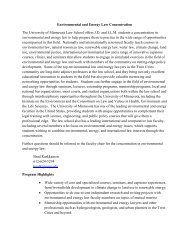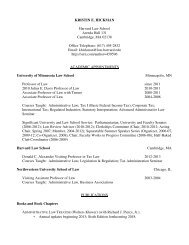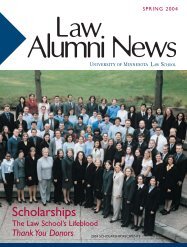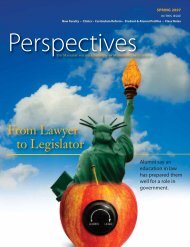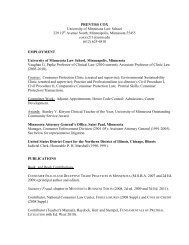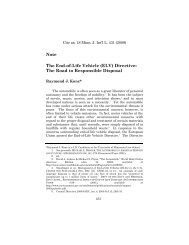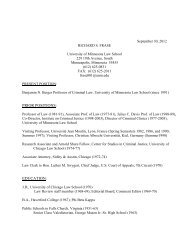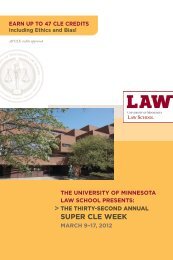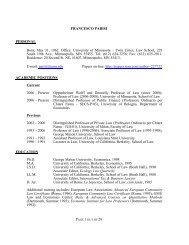Enabling Private Ordering - the University of Minnesota Law School
Enabling Private Ordering - the University of Minnesota Law School
Enabling Private Ordering - the University of Minnesota Law School
Create successful ePaper yourself
Turn your PDF publications into a flip-book with our unique Google optimized e-Paper software.
2009] UMBRELLA CLAUSES 15<br />
relationship between <strong>the</strong> State and private individuals. A broad<br />
interpretation <strong>of</strong> umbrella clauses is viewed as transforming<br />
breaches <strong>of</strong> contract into breaches <strong>of</strong> a treaty, although <strong>the</strong><br />
investor is not a subject <strong>of</strong> international law. 27 The more<br />
restrictive approach is, <strong>the</strong>refore, driven, as <strong>the</strong> Tribunal in El<br />
Paso v. Argentina pointed out, by avoiding <strong>the</strong> “far-reaching<br />
consequences <strong>of</strong> a broad interpretation <strong>of</strong> <strong>the</strong> so-called umbrella<br />
clause, quite destructive <strong>of</strong> <strong>the</strong> distinction between national<br />
legal orders and <strong>the</strong> international legal order”. 28 Under this<br />
approach, tribunals treat <strong>the</strong> contract claim/treaty claim<br />
distinction as a firm rule <strong>of</strong> customary international law that<br />
could only be displaced by treaty provisions that express more<br />
clearly <strong>the</strong> intention <strong>of</strong> States to break with <strong>the</strong> purportedly<br />
strict distinction between international and municipal law. The<br />
wording <strong>of</strong> umbrella clauses, by contrast, is not considered to be<br />
sufficient for this objective. 29<br />
27. El Paso Energy, ICSID Case No. ARB/03/15, para. 82 (“[A]n umbrella<br />
clause cannot transform any contract claim into a treaty claim, as this would<br />
necessarily imply that any commitments <strong>of</strong> <strong>the</strong> State in respect to investments, even<br />
<strong>the</strong> most minor ones, would be transformed into treaty claims.”); see also id., para.<br />
77 (pointing out that a broad interpretation <strong>of</strong> <strong>the</strong> umbrella clause would yield <strong>the</strong><br />
consequence that “<strong>the</strong> division between <strong>the</strong> national legal order and <strong>the</strong><br />
international legal order is completely blurred”); SGS v. Pakistan, ICSID Case No.<br />
ARB/01/13, at para. 172 (describing umbrella clauses as resulting in a<br />
“transubstantiation <strong>of</strong> contract claims into BIT claims”).<br />
28. El Paso Energy, ICSID Case No. ARB/03/15, para. 82; see also SGS v.<br />
Pakistan, ICSID Case No. ARB/01/13, at para. 166 (“As a matter <strong>of</strong> textuality . . . <strong>the</strong><br />
scope <strong>of</strong> Article 11 <strong>of</strong> <strong>the</strong> BIT, while consisting in its entirety <strong>of</strong> only one sentence,<br />
appears susceptible <strong>of</strong> almost indefinite expansion.”). The emphasis on <strong>the</strong><br />
delineation between <strong>the</strong> national and <strong>the</strong> international legal order echoes some<br />
earlier writings on umbrella clauses. In view <strong>of</strong> <strong>the</strong> blurring effect <strong>the</strong> clauses have<br />
on <strong>the</strong> relationship between national and international law, Prosper Weil asserted<br />
that his interpretation would have to focus on <strong>the</strong> delineation <strong>of</strong> <strong>the</strong> national and<br />
international legal order. See Weil, supra note 3, at 101 (“[L]e problème ne soit plus<br />
seulement, dans ce cas, de définir les droits et obligations respectives des deux<br />
parties, mais également, et peut-être au premier chef, celui des frontières entre les<br />
divers ordres juridiques.”).<br />
29. See SGS v. Pakistan, ICSID Case No. ARB/01/13, at para. 171 (holding that<br />
<strong>the</strong> clause in question in <strong>the</strong> Swiss-Pakistani treaty “would have to be considerably<br />
more specifically worded before it can reasonably be read in <strong>the</strong> extraordinarily<br />
expansive manner submitted by <strong>the</strong> Claimant”). Similarly on <strong>the</strong> relationship<br />
between established rules and principles <strong>of</strong> international law and overriding treaty<br />
provisions, see Elettronica Sicula S.p.A. (ELSI) (United States <strong>of</strong> America v. Italy),<br />
1989 I.C.J. 15, 42 (Judgment <strong>of</strong> July 20), which states that “<strong>the</strong> Chamber finds itself<br />
unable to accept that an important principle <strong>of</strong> customary international law should<br />
be held to have been tacitly dispensed with, in <strong>the</strong> absence <strong>of</strong> any words making<br />
clear an intention to do so.” See also Legal Consequences for States <strong>of</strong> <strong>the</strong> Continued<br />
Presence <strong>of</strong> South Africa in Namibia (South West Africa) Notwithstanding Security<br />
Council Resolution 276, 1971 I.C.J. Reports 16, 47 (Advisory Opinion <strong>of</strong> June 21);



